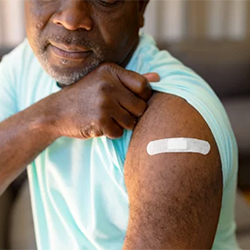By Landon Gray
The FDA authorized a second booster dose of messenger RNA (mRNA) vaccine against COVID-19 for those at higher risk for severe disease, hospitalization and death—people 50 years of age and older, and some immunocompromised individuals. Shortly afterward, the CDC endorsed the authorization and updated its recommendations to allow the additional boosters.
“Current evidence suggests some waning of protection over time against serious outcomes from COVID-19 in older and immunocompromised individuals. Based on an analysis of emerging data, a second booster dose of either the Pfizer-BioNTech or Moderna COVID-19 vaccine could help increase protection levels for these higher risk individuals,” said Peter Marks, MD, PhD, the director of the FDA’s Center for Biologics Evaluation and Research.

According to the new authorizations:
- a second booster dose of either mRNA vaccine may be administered to people 50 years of age and older at least four months after receipt of a first booster dose of any authorized or approved COVID-19 vaccine;
- a second booster dose of the Pfizer-BioNTech COVID-19 vaccine may be administered to individuals 12 years of age and older with certain immunocompromised conditions, such as those who have undergone solid-organ transplantation, or who are living with conditions that are considered to have an equivalent level of immunocompromise, at least four months after receipt of a first booster dose; and
- a second booster dose of the Moderna COVID-19 vaccine may be administered at least four months after the first booster dose of any authorized or approved COVID-19 vaccine to immunocompromised individuals 18 years of age and older.
Based on data provided by the Ministry of Health of Israel, the FDA reviewed the administration of approximately 600,000 fourth doses (second booster) of the Pfizer-BioNTech COVID-19 vaccine given at least four months after the third dose in adults 60 years of age or older (approximately 100,000 were ≥18 years of age).
To evaluate the safety of a second booster dose of the Moderna COVID-19 vaccine, an independent study administered a second booster to 120 participants 18 years of age and older who had received two primary doses and a first booster dose of Pfizer-BioNTech COVID-19 vaccine at least four months prior.
The data from both studies revealed no new safety concerns, the FDA said.
The confidence in the accuracy in these studies’ data allowed the FDA to bypass the traditional advisory committee panel to update the authorization guidelines, according to Dr. Marks.
The FDA also reviewed immunogenicity data from an ongoing open-label, nonrandomized clinical study in healthcare workers at a single center in Israel. Four months after receiving either dose of the first booster shots, study participants showed increases in neutralizing antibody levels against SARS-CoV-2, including the delta and omicron variants, two weeks after the second booster, compared with five months after the first booster dose.
In addition, according to the CDC, recently published data supported a second mRNA booster among adults who received the Johnson & Johnson’s Janssen adenovirus COVID-19 vaccine for their primary series and either the adenovirus or mRNA vaccine booster. The VISION Network looked at several different booster strategies because there are not a lot of data about mixing and matching boosters. They said all booster strategies offered more protection than just one J&J vaccine. They found the vaccine effectiveness against hospitalizations was 31% for one J&J dose; 57% after 2 doses of the adenovirus vaccine; 78% after 1 J&J and 1 mRNA dose compared with 83% for those who had the two dose-primary series of mRNA and one booster of mRNA. (MMWR Morbid Mortal Wkly Rep 2022 March 29. DOI: http://dx.doi.org/10.15585/mmwr.mm7113e2).
Two-thirds of eligible people have received their first booster dose, which Dr. Marks explained remains the most durable and reliable protection against severe effects, including death from COVID-19, especially for people 65 years of age or older.
Rochelle P. Walensky, MD, MPH, the director of the CDC said that boosters were important for these groups because “they are the most likely to benefit from receiving an additional booster dose at this time.”
The pandemic has disproportionally affected certain groups, and the agencies wanted to assure that they are better protected, according to Dr. Marks.
“COVID-19 has had a really disproportional adverse effect on people 65 years of age and older, and those with comorbidities,” Dr. Marks said. “One in a hundred of [people 65 years or older] are not with us today, who were with us before the pandemic, because of COVID-19.”
Data continue to show the importance of vaccination and booster doses to protect individuals both from infection and severe outcomes of COVID-19, the CDC said in a statement. During the recent omicron surge, those who were boosted were 21 times less likely to die from COVID-19 compared with those who were unvaccinated, and seven times less likely to be hospitalized.
The FDA said it will continue to evaluate data and information as they become available when considering the potential use of a second booster dose in other age groups.
Because natural and vaccine immunity wanes over time, Dr. Marks said he would not be surprised if people needed an additional booster this fall.

